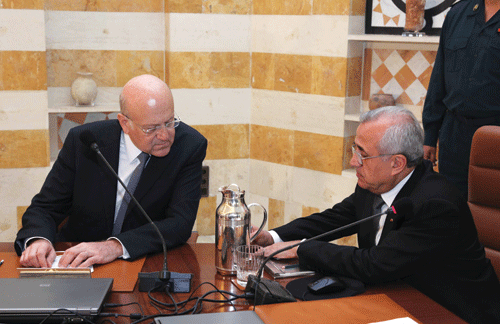Bit by bit, the Lebanese entrepreneurial puzzle is coming into place. A startup in Lebanon now can have access to incubators, accelerators and associations supporting entrepreneurship as well as financial backers. “The entrepreneur does not feel alone anymore; he would get enough support now to succeed; a lot of things are happening,” says Sami Beydoun, managing partner of Lebanon-based incubator Berytech’s fund.
As the bits of the puzzle come together, the financial investors — keen on supporting entrepreneurship but also of course driven by profit — become more interested in the space. Startups can also have access to subsidized loans offered by Kafalat, the government-sponsored institution supporting small and medium enterprises, which guarantees up to 90 percent of a startup loan taken by a commercial bank. Startups are also increasingly getting access to equity offered by various venture capitalists.
Initial backers
The first venture capital (VC) fund to set up shop in Lebanon to invest in local talent only fours years ago, with Berytech launching a $6 million fund in 2008. The fund reached its four-year mandate to complete investments this year, and has extended it by another year with an aim of deploying the remaining 30 percent of the fund in the next six months. Berytech is now raising capital for a second fund expected to be between $20 million to $30 million in size, and be up and running by the first half of 2013.
Following Berytech’s move into the equity space, other venture capitalists started stepping in. Examples include Middle East Venture Partners’ $10 million fund launched in 2010, Cedrus Ventures’ $5 million fund launched a year ago and the $50 million Lebanon Growth Capital Fund — with $30 million committed so far — of Riyada Enterprise Development (RED), part of Abraaj Capital, the Middle East’s largest private equity firm, also launched a year ago. Accelerators are feeling the equity buzz as well with Beirut-based Seeqnce injecting capital into newly formed startups in August of this year.
“We need more and more venture capitalists” says Khater Abi Habib, chairman of Kafalat. In fact, the government-sponsored institution might be drifting away from just providing loans. According to Abi Habib, there are advanced discussions with the Lebanese state and the World Bank to launch a long-term capital fund to invest in entrepreneurship alongside Kafalat loans. The size would be “tens of millions of dollars” says Abi Habib, while declining to disclose additional information for now.
Finding the right deals
Raising equity in Lebanon with a goal of injecting it into Lebanese entrepreneurial ventures is a different ballgame to the capital raising process undertaken in the developed world. First and foremost is the lack of a key exit strategy for equity investments: a liquid and attractive stock exchange. Other factors come into play as well. “At the international level, pension funds strategically invest in private equity as part of their asset allocation,” says Elie Habib, Lebanon’s country manager of RED. “Here in Lebanon, it’s high net-worth individuals who don’t have a strategy to invest in private equity and as such, it’s a different type of fund raising than what you see in the Western world.”
While raising equity is a demanding task, especially given the dire economic conditions in the country prompting investors to hold tight, some VCs consider the lack of deal flow as the major challenge they face. “Capital raising is the least difficult part; the harder part is the deal flow and finding the right deal to invest in,” says Beydoun. For the deal flow that they do come across, lack of quality management seems to be a key issue. Michel Nehme, founder of Cedrus Ventures, is mostly concerned about the caliber of the team. He has not invested in a single startup yet and says he is looking for “complete teams ready from the get-go”.
Problems with valuation
One gripe that venture capitalists Executive spoke with all agreed on is the valuation issue, stating that VCs and entrepreneurs are often at odds when discussing valuation and the gap between what the entrepreneurs expect and what the VCs demand is significant. “Entrepreneurs spend more time on dreams than on facts. If they spent more time on facts then it would work out,” says Beydoun.
When valuing a startup, each VC adopts its own method, as it is not a perfect science. “There is no truth with a capital ‘T,’” says Nehme. The task becomes more daunting when the startup is newly established and has no historical performance to base the valuation on.
If the venture has been in operation for a few years, the method most commonly used is the discounted cash flow method, consisting of forecasting future cash flow generation and discounting it back to the present. “We always go for discounted cash flow; it is important because it is a good way of looking at the overall health of the organization versus its ability to translate value proposition into free cash flow to investors” says Habib.
Other methods used for valuing companies are less efficient in Lebanon — mainly the comparable method and the multiples method. The comparable method consists of looking at financial transactions such as mergers and acquisitions that have taken place in the same industry as the company being valued and assign a valuation based on those comparisons, but “they are hard to find,” says Beydoun and “if you find them, they are secretive about their numbers”.
The multiples method consists of looking at multiples such as the price to earnings multiple more commonly known as the PE ratio or the EBITDA (earnings before interest tax depreciation and amortization) multiple of companies in the same industry, then applying a multiple to the company being valued in line with the industry. Given the political risk inherent in Lebanon, a discount must be applied to the company being valued. This is done on a case-by-case basis, as it depends on how exposed the company is to the country, what other countries it is exposed to, etcetera. “If a company has contracts in Africa for instance, the discount applied is different to a company with all its business in Lebanon and so very sensitive to the turmoil going on, but they all get discounted,” says Habib.
A newly formed startup, however, would not have generated cash flow or not enough cash flow to be able to forecast future payments and base a valuation on those payments. In this case, a more subjective method is applied consisting of analyzing the team and the amount of money and time invested. “The highest value we put is on the team at this stage of life of the company. Are they capable of taking it forward?” asks Beydoun.
Different expectations
Regardless of the valuation method used, entrepreneurs need to demonstrate ambition, vision and the determination to succeed, and acknowledge that they are operating in a different environment and cannot expect the same valuation given to companies in the developed world. “I want to tell entrepreneurs: don’t go read TechCrunch or Venture Beat [technology web publications] and come and say, ‘look what’s happening and I want the same thing’. We are in a completely different sphere, planet and galaxy,” says Habib. “Collect as much information as possible and read thoroughly and when in doubt go to people who might know and ask,” recommends Kalafat’s Abi Habib.
With increasing support for entrepreneurs in Lebanon, their chances of success should increase. Despite the lower valuations people need to accept for their startups relative to the developed world, more entrepreneurs will come forward and take the chance of launching their own businesses as the entrepreneurial puzzle completes. “You need more entrepreneurs at the end of the day to make it happen,” says Habib.













-(3).gif)


.gif)













![Friday[4]](https://www.executive-magazine.com/wp-content/uploads/2014/01/Friday4.jpg)




